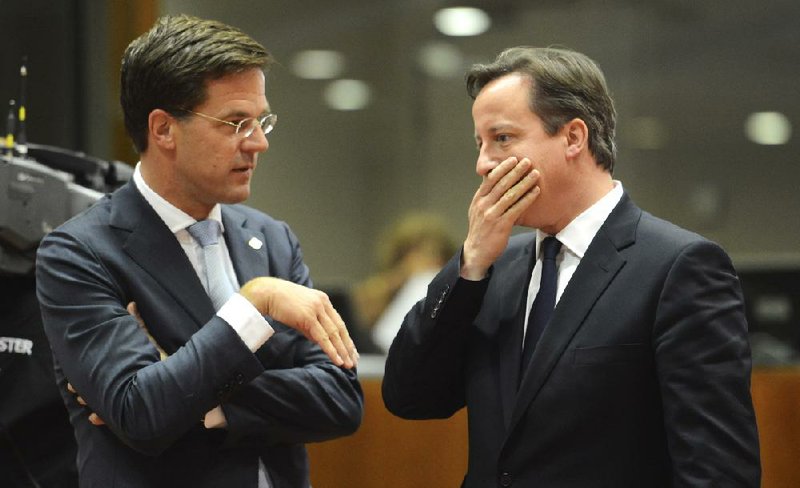BRUSSELS, Belgium — European leaders agreed Thursday that more needs to be done to stimulate growth and regulate banks, though divisions remain over the issue of pooling government debt as a way to ease the continent’s financial crisis.
At the start of a two-day European Union summit, leaders agreed on $149 billion in spending geared toward job creation, as well as some new measures thatmight reassure investors that Spain and Italy will be able to manage their debts.
“I expect that there will be a decision on a further step toward rebuilding the economic and monetary union,” European Commissioner for Economic Affairs Olli Rehn said shortly before the summit began. “We also need concrete decisions on a short-term stabilization of financial markets, especially sovereign debt markets.”
The EU leaders were expected to work well into the night Thursday.
German Chancellor Angela Merkel has rejected the most obvious way of reducing borrowing costs for the southern European countries: by quickly issuing “eurobonds,” or debt backed by all countries.
She said eurobonds should be part of Europe’s effort to integrate, but can only happen once national governments have agreed to give a central authority the power to change their budget policies. That could take years.
As the biggest economyamong the 17 countries that use the euro, Germany would have to shoulder the brunt of the debt, and Merkel has been reluctant to burden German taxpayers. She is also concerned it would ease the pressure on financially weaker countries to overhaul their economies. That includes making labor markets more flexible, lowering business costs, cutting red tape and fighting tax evasion. Spain also needs to force its banks to cover huge real-estate market losses.
“I think we should stop talking about eurobonds now because, with the German government’s ‘no,’ with this definitive ‘no’ from Mrs. Merkel, eurobonds are now a nonissue,”the president of the European Parliament, Martin Schulz, said Thursday.
While pressure on Merkel has been building, she is not alone in her opposition to eurobonds. Austria, Finland and the Netherlands are also opposed.
Dutch Prime Minister Mark Rutte spoke forcefully Thursday against the idea.
He said the only way for Spain and Italy to get out of the crisis is to keep cutting government costs and overhauling their economies, though he signaled the Netherlands is willing to let them tap one of Europe’s bailout funds if they request aid.
Five euro countries have so far asked for financial aid from their partners in the currency union. Greece, Ireland and Portugal have taken rescue loans to finance their government debt.Spain has asked for as much as $125 billion for its banks. Cyprus has sought aid for its banks as well.
Europe’s current bailout fund has $547 billion to rescue countries or their banks, but only $311 billion left after previous rescues. That would not be enough to bail out the Spanish or Italian governments.
Investors are looking for signs of a clear strategy to deal with the debt crisis, which is weakening economies across Europe, including Germany’s. They are not hopeful, though, and sold off stocks across Europe on Thursday.
“The good news is that this time around expectations are very low; the bad news is that the main players seem to be diametrically opposed when it comes to a strategy for endingthe crisis,” said Gary Jenkins, managing director of Swordfish Research, a London-based consulting firm.
The French plan to stimulate growth, and thereby increase government tax revenue, is relatively modest. Although worth $162 billion, it is expected to consist mostly of European funds already earmarked for development.
Far more urgent is finding a way to keep the cost of borrowing money sustainable for weaker euro countries.
Economists say Spain can only pay the current high rates - at 7 percent for 10-year bonds - for a few more months. After that, it is likely to ask for a eurozone bailout to finance its debts. That rescue money could range in the hundreds of billions of dollars.
Business, Pages 25 on 06/29/2012

